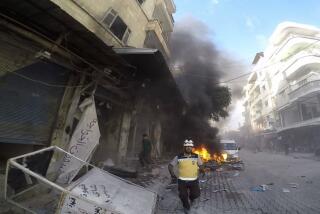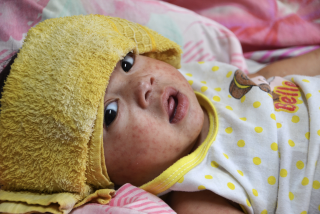Wrongly mixed vaccine suspected in deaths of 15 Syrian infants
The use of an improperly mixed vaccine in a measles-immunization campaign apparently led to the deaths this week of at least 15 infants in a rebel-held corner of Syria, a preliminary investigation has found.
As many as 75 children may have been injected with a vaccine mixed with a muscle relaxant, the inquiry found, but most survived.
Health authorities concluded that the vaccine was probably mixed with the drug atracurium, used as an anesthetic in surgery. In large doses, the drug can cause respiratory paralysis and death.
Investigators were still trying to determine whether the tragedy was the result of “an inadvertent error ... or [a] criminal act,” said a report from a commission of inquiry formed by the Syrian National Coalition, the U.S.-backed opposition umbrella group that helped facilitate the immunization drive.
Confusion in packaging may have contributed to the incident, the report said. Investigators found a “great resemblance” between vials used for the vaccine and those containing the muscle relaxant.
All of the dead were between 6 and 18 months old, concluded the inquiry in results released late Wednesday, adding that older children were more likely to survive. Affected children exhibited symptoms of “diarrhea, shock and respiratory failure,” said the report.
The deaths in northwestern Syria’s Idlib province, first reported Tuesday, provoked outrage and fear among residents of rebel-held areas of the province, an opposition stronghold.
The Syrian National Coalition called upon all citizens “to not believe in rumors that are being spread by groups seeking to incite chaos and panic among the public.”
The coalition has helped provide aid to rebel-held areas in northern Syria where state institutions have all but disappeared. Much of the assistance is trucked in from neighboring Turkey. But the origin of the vaccine and the muscle relaxant was not immediately clear.
In recent weeks, the report said, teams from a “measles working group” had provided vaccinations to tens of thousands of youngsters across a wide stretch of Syria. There had been no previous reports of “serious complications,” the inquiry said. But the deaths prompted the suspension of the immunization drive in Syria’s Idlib and Dair Alzour provinces, the opposition said.
Although the immunization campaign had included dozens of centers, all of the deaths were in the vicinity of a cluster of Idlib villages, including Jarjanaz, the opposition said.
Contrary to some published reports, “there was no U.N. agency directly involved in this vaccination campaign,” said Christian Lindmeier, a World Health Organization spokesman reached in Geneva.
A joint statement released by United Nations Children’s Fund and the WHO said: “Establishing the precise cause of the children’s deaths is vital.” The WHO has deployed a team to provide assistance to investigators seeking to determine what went wrong, the U.N. said.
Dr. Bashir Taj al-Deen, a member of the technical committee for the Syria measles campaign, said that the immunization campaign began in August after more than 8,500 children had been afflicted with the disease since 2013. The vaccines came from the Turkish Ministry of Health, he said.
He worried the effect the deaths would have on parents who now might be reluctant to vaccinate their children.
“The purpose of the vaccines is to protect the children from these biological diseases,” he said. “Fifteen kids is not little, but these diseases could put thousands of lives at risk.”
“A mistake happened and those responsible will be held responsible,” he said, “but the vaccination must continue.”
Measles is the fifth-leading cause of death among children younger than 5, according to UNICEF. Cases have been reported on the increase in war-ravaged Syria.
The deaths, experts said, highlighted the catastrophic state of healthcare in much of Syria after three years of fighting. Hospitals have been shuttered, doctors have fled and been killed, sanitation is poor, medicines are in short supply and shelter and nutrition are often substandard. Many volunteer medics lack essential skills.
“It shows the urgent need for training and proper coordination,” said Dr. Adam Coutts, a London-based public health expert who has researched the health crisis on the ground in Syria.
Bulos is a special correspondent. Times staff writer McDonnell reported from Beirut. Staff writer Raja Abdulrahim in Irbil, Iraq, contributed to this report.
Follow @mcdneville on Twitter for news out of the Middle East
More to Read
Start your day right
Sign up for Essential California for news, features and recommendations from the L.A. Times and beyond in your inbox six days a week.
You may occasionally receive promotional content from the Los Angeles Times.







